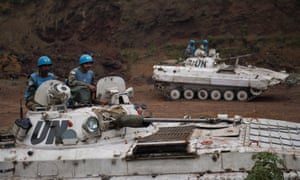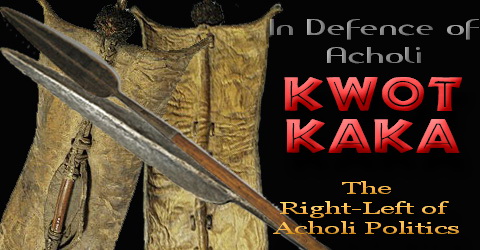{UAH} Attack kills at least 14 UN peacekeepers and five soldiers in DR Congo

Heavily armed militants have killed at least 14 peacekeepers and five soldiers in the Democratic Republic of the Congo (DRC) in one of the worst attacks on United Nations personnel in recent memory.
More than 50 peacekeepers were left wounded, many seriously, after fighters from a local Islamist extremist group overran a remote base in the east of the vast central African country after hours of confused fighting late on Thursday evening.
António Guterres, the UN secretary general, described the attack as the worst in the UN's recent history and "a war crime".
"Today is a very tragic day for the UN family …. I condemn this attack unequivocally," Guterres said.
Local officials said Congolese army troops stationed several miles from the base sustained casualties when they attempted to come to the aid of the UN forces, but were ambushed and beaten back.
The UN mission in the DRC said on Friday evening it was coordinating medical evacuations from the base, situated near a bridge on the river Semuliki, 40kms north east of the town of Beni.
A UN spokesperson in Kinshasa, the capital, said the attack was "huge".
Most of the dead and wounded are believed to be from Tanzania, which has more than 1,250 soldiers serving as peacekeepers in the DRC.
The base was home to the peacekeeping mission's rapid intervention force, which has a rare mandate to go on the offensive.
Rival militia groups still control swathes of mineral-rich eastern Congo, nearly a decade and a half after the official end of a 1998-2003 war that killed millions of people, mostly from hunger and disease.
The attack on the UN base has been blamed by the UN on the Allied Democratic Forces (ADF), a reclusive local group which adheres to a rigorous Islamist vision and has a history of violence.
"The ADF is an Islamist armed group which imposes discipline based on a strict interpretation of the sharia and which is known to be extremely brutal. It is very likely the ADF were involved but also other groups ... The ADF have been in the area for 20 years and has deep links with all kinds of people," said Jason Stearns, director of the Congo Research Group at New York University.
The ADF has launched a series of bloody attacks in recent months. UN forces and national Congolese troops have mounted operations against the group. A peacekeeper was shot and killed during a firefight in September.
An ambush blamed on the group killed at least 26 people in an attack on civilians on motorbikes in October near Beni. Two peacekeepers were killed and several wounded in a separate attack.
The group, which is largely composed of converts, is not thought to have any significant links to other Islamist extremist organisations in Africa or the Middle East, though a video recently surfaced showing fighters apparently in the DRC claiming allegiance to Islamic State.
The UN peacekeeping mission in Congo has recorded 93 fatalities of military, police and civilian personnel.
Established in 2010, it is the largest and most expensive in the world and is aimed at stabilising the restive east of the huge mineral-rich nation.
The DRC is facing a grave humanitarian emergency, economic deterioration and worsening political instability.
"The scale of people fleeing violence is off the charts, outpacing Syria, Yemen and Iraq," the Norwegian Refugee Council's DR Congo director, Ulrika Blom, said earlier this week.
President Joseph Kabila, in power since 2001, has ignored calls to step down after his second mandate expired almost a year ago and police have brutally crushed a series of protests. Under pressure from the US and others, Kabila has now agreed to hold elections in 12 months, though many doubt his good faith.
"Kabila does not have any intention to leave power ... his strategy is to spread chaos across the country and then delay elections because he'll claim there is too much violence," said Felix Tshisekedi, a prominent opposition leader in an interview with the Guardian earlier this week.
The crisis has led to a breakdown in law and order, with a series of massive prison breaks and growing conflict between militias across the south and east of the country which have killed thousands and displaced millions.
The upsurge of ADF activity, which has been recruiting intensively in recent months, is part of this broader pattern, experts say.
"Armed groups are political animals ... They feel that something is going to happen - elections, negotiations, whatever - so are positioning themselves," said Stearns.
Few observers see much cause for optimism.
"Congo is going to go pretty badly next year. The humanitarian crisis is up there with Yemen and Syria and the situation is degrading, the region is getting nervous and the overall situation will become more fractured and more violent," said Stephanie Wolters, the head of a peace and security research programme at the International Strategic Studies centre, Pretoria.
Maman Sidikou, the special representative of the secretary general of the United Nations in the DRC promised action "to ensure that the perpetrators are held accountable and brought to justice".

Disclaimer:Everyone posting to this Forum bears the sole responsibility for any legal consequences of his or her postings, and hence statements and facts must be presented responsibly. Your continued membership signifies that you agree to this disclaimer and pledge to abide by our Rules and Guidelines.To unsubscribe from this group, send email to: ugandans-at-heart+unsubscribe@googlegroups.com






0 comments:
Post a Comment